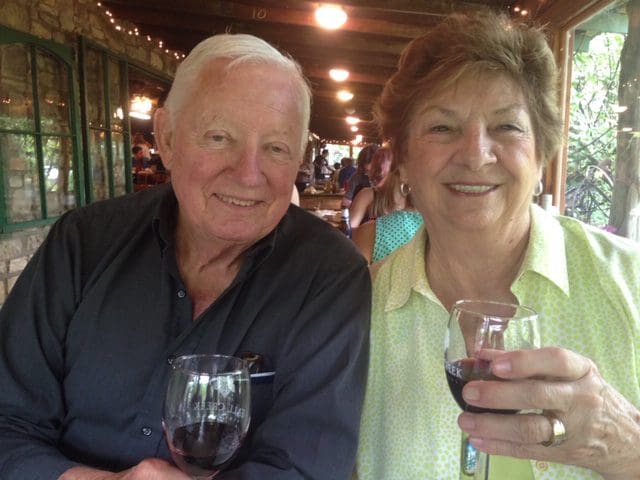
By Victoria Schlabig
Phase 2 of reopening brings concern to some high-risk seniors


Dick and Donna Bright
As Florida proceeds with Phase 2 of reopening, people are expressing mixed feelings on whether the plan is being rushed or whether the coronavirus pandemic was exaggerated in the first place. People facing a higher risk may have more to worry about and may feel safer remaining in quarantine as their friends and family begin to return to “normal life.”
A few Lake County residents who are at a higher risk of developing a severe illness if they were to contract the virus shared differing opinions on the subject, but they all agree that they don’t like the way the U.S. government has handled the COVID-19 situation.
CDC considers a person “high-risk” if they are 65 years and older or live in a long-term or nursing facility, those with lung disease or asthma, serious heart conditions, those who are obese (with a BMI of 40 or higher), and those with diabetes, liver disease, chronic kidney disease who are undergoing dialysis and those who are immunocompromised.
“We’re opposed to reopening too soon,” says Dick Bright, of the Village of Calumet Grove in The Villages. “I’ll have to admit we’re very anti the way the government is handling this. Everybody that we know who are professionals feel the same way.
Dick and his wife, Donna, both 83, have worries regarding their health. Dick has diabetes and arrhythmia, for which he takes pills. Donna, who is fairly healthy overall, develops pneumonia easily when she gets a cold or the flu, so she has been more careful than her husband with precautions against the coronavirus.
“We’ve maintained a pretty quiet existence,” Dick says. “I have hand therapy for arthritis, and I go out to grocery shop. That’s about it. I broke both of my big toes falling out of bed so that enforces me staying in—can’t play golf, can’t go swimming, all that.”
As gyms and recreation centers open up, Dick probably will start going to them, but Donna will not.
“I accuse her of being too concerned, and she says, ‘No, I’m just too angry,’” he says.
Dick runs the Diabetic Community Support Club, which has been unable to meet while facilities are closed in The Villages. The group consists of 50-70 people, so it is too large to meet on Zoom and meetings have been canceled until September. For those who may not know, Zoom is a video-conferencing app that has become increasingly popular for schools, companies, families and friends during quarantine.
The couple’s daughter and her husband are both doctors in New Jersey and they call every day to make sure the Brights are staying home.
“One of the things that has helped us is Zoom,” Dick says. “We even had a family reunion in April by way of Zoom.”
Ellen Wilcox, 82, of Harbor Hills Country Club in Lady Lake. expresses anger toward how the U.S. government has handled the response to the pandemic.
“I understand that this can be a devastatingly life-threatening disease, but I personally believe that there are political motivations behind this,” Ellen says. “People who are dying with the disease are not dying from the disease—that’s a big distinction. If you already have major health issues and you get the flu, or even a cold that turns into pneumonia, you will die. You will not have the strength and the immune system to fight off the disease.”
Though she has had heart disease for more than 30 years, Ellen says, “I’m probably the healthiest 82-year-old in Lake County,” she says. “I
have been forced into a living situation where there was nothing to do, no place to go, and with friends my age and younger who are terrified of contracting the disease.”
She believes media reports have been a “gross exaggeration,” and that people’s lives have been “unnecessarily devastated.”
“Young people in particular are going to have years and years and years and years of recovery from this. It’s not going to happen quickly. And I feel very sad for my children, my grandchildren and my great-grandchildren,” Ellen says.
She says that high school graduations, class parties and proms may seem trivial during a pandemic, but they are once-in-a-lifetime events that will be missed.
As for herself, she has had to cancel three overseas trips, including one in mid-trip. She was in Norway on a cruise when the United States announced it would be quarantining travelers. She was forced to book an early flight home or risk potentially being quarantined on the cruise ship.
Ellen, who has traveled to 38 countries, says Americans typically are afforded more freedoms than people in any other country in the world.
“My overruling feeling is that my personal freedoms and liberties have been taken away from me and they are not ever likely to be restored,” she says.
Health and safety concerns are on the mind of Patricia French, 73, of the Village of Glenbrook in The Villages. She is president of the Airheads COPD Support Group, which typically has 60-80 members during the peak snowbird season and about 35 members the rest of the year.
“Since we are a prime target for the virus, we have chosen to furlough our get-togethers until September. We’re staying in touch with each other, sharing phone numbers and email addresses, and I issue a newsletter at least once a month with any news that I have,” Patricia says.
“We’re working on having some kind of get-togethers monthly through Zoom and then, hopefully in the fall and the winter, we use that when people are ill and can’t come to the meetings—don’t want to spread germs or whatever,” she adds.
She also participates in two diabetes support groups and one gluten-free group, all of which are on furlough until September. Severe seasonal allergies and rheumatoid arthritis also put her immune system at risk.
“I’ve always been cautious because I have a compromised immune system, so I’ve had to stay away from people—no shaking hands, no hugs, no kisses—which has not made people very happy, but now they understand,” Patricia says.
Patricia has been staying safe during the past few months mostly by staying home, being active outside and taking walks.
“I find it difficult because of my condition to wear a mask because it inhibits my breathing, so when I’m out in a crowd, I really use social distancing to the extreme,” she says.
She also expressed some concerns about Florida’s reopening.
“I wouldn’t say (Florida) is rushing but I would say (the government) is not as cautious and considerate as I think they should be,” Patricia says.
As Florida continues to reopen and get back to “normal,” whatever this new normal turns out to be, the CDC urges citizens to continue to follow social distancing guidelines. Even if you don’t consider yourself in danger of contracting COVID-19, those who may be asymptomatic could easily pass the virus on to others if they aren’t following CDC guidelines and being careful. You can find CDC’s specific guidelines at cdc.gov/coronavirus.
Originally from Buffalo, NY, Victoria graduated from Canisius College in 2018 with a bachelor’s degree in English and Writing. In August of 2019, she relocated to Eustis, Florida, and soon began at Akers Media Group assisting with social media projects. Later that year, she was promoted to a full-time writing position at the company and has since found her niche telling the stories of so many of Lake and Sumter County’s awesome people.









